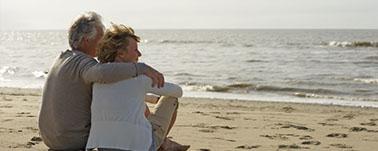Did you know...?

For every additional year of education, the risk of dementia decreases by 11%.
Brayne, Ince, Keage, McKeith, Matthews, Polvikoski & Sulvaka (2010) - Education, the brain and dementia: neuroprotection or compensation? (URL)

Pablo Casals, who is known as the world's greatest cellist, practiced this instrument for four or five hours every day even when he was 90 years old. When he was asked why at his age, he still practiced so hard, he responded, "Because I think I am making some progress.

At the age of 71, Katsusuke Yanagisawa, a retired Japanese schoolteacher, became the oldest person to climb Mt. Everest.

The oldest working general practitioner was 100 years old. Dr Kauromal M. Chandiramani (India, born on 9 May 1899) practised as a general practitioner in Bombay for 75 years.

At the age of 52, despite battles with diabetes and arthritis, Ray Kroc set out to build the McDonald's brand. Kroc continued to be involved in McDonald's operations until his death in 1984 at the age of 82.

The famous poet and writer Goethe worked his whole life long. He finished his famous book Faust at the age of 82, the same age he passed away.

The oldest person in the world receiving a doctorate is a 102-year-old German woman.

Stanislaw Kowalski is the oldest (104 years old) athlete running a 100m race. He ran 100m in 32.79 seconds in 2014 during a competition in Poland.
Glanfield (2014) - Runner, 104, sets a new European centenarian record after running 100m I a speedy 32.79 seconds and claims the secret to his fitness is ‘doing everything I want’. (URL)

At the age of 75, cancer survivor Barbara Hillary became one of the oldest people, and the first black woman, to reach the North Pole.

Norman Lloyd is a Hollywood movie actor of 100 years old and his latest movie came out in 2015. He has been working in the movie business for more than 80 years.

Sitting for five or more hours per day can be as bad for your health as smoking a package of cigarettes a day.

Every minute, two people in the world celebrate their 60th birthday

Switzerland ranks first in the Global AgeWatch Index, which measures the social and economic well-being of older people, followed by Norway, Sweden, Germany and Canada.

At the age of 89, Arthur Rubinstein performed one of his greatest recitals in Carnegie Hall.

In Lisbon (Portugal), graffiti workshops are organised for senior citizens who are 65 years and older.
Electronic Platform for Adult Learning in Europe (2015) - Meet the graffiti grannies taking over Lisbon. (URL)

Fauja Singh is the oldest marathon runner, and ran his last marathon at the age of 101 years. The oldest female marathon runner is 92 years and completed her latest marathon in June 2015.
Badshah (2013) - The world’s oldest runner, Fauja Singh, on life since his retirement. (URL)

Younger workers are more likely to have an accident, but older workers may have more serious injuries and fatal accidents.

There are currently four people of working age in the EU for every person over 65 years of age. By 2060, there will be only two.

In 2080, 12.3% of the total EU population will be 80 years and above, compared to 5.1% in 2014.
Eurostat (2015) - Population structure by major age groups, EU28, 2014-80 (% of total population). (URL)

Italy has the largest proportion of people over 65 years in Europe (21.4% in 2014), followed by Germany (20.8%), and Greece (20.5 %). Moreover, Italy is the most rapidly ageing country in the EU.

At the age of 88, Michelangelo created the architectural plans for the Church of Santa Maria degli Angeli in Rome.

The number of people worldwide who are aged 60 years and over was 605 million in 2000 and is expected to increase to 2 billion by 2050. That’s almost equal to the entire population of China, the US, Russia and Japan combined.

Life expectancy at birth in Europe is currently highest in Spain (83.2 years), Italy (82.9 years) and Cyprus (82.5 years). In Malta, people can expect to spend the largest part of their lives in good health (72.7 years for females and 71.6 years for males).

By 2060, the fastest growing part of the EU’s population will be the over-80 age group.

Although some of the variations in older people’s health reflect their genetic inheritance, most is due to their physical and social environments, and the influence of these environments on their opportunities and health behaviour (diet, physical activity, smoking, alcohol consumption).

Biological ageing is only loosely associated with person age in years. Some 80 year-olds have physical and mental capacities similar to many 20 year-olds.

Cognitive skills, such as intelligence, knowledge, language and complex problem-solving skills are likely to increase until the age of 60.
Health and Safety Laboratory (2011) - An update of the literature on age and employment. (URL)

Over 60% of people who are over 50 years of age feel as fit as they ever did.
Equality and Human Rights Commission (2010) - Working better. The over 50s, the new work generation. (URL)

Nearly 1 in 5 workers above 50 years of age do not believe they will be able to do the same job when they are 60 years old.
European Working Conditions Survey (2010) - Q75: ‘Do you think you will be able to do your current job when you are 60 years old? (URL)

The hardest things to deal with for workers over 55 years of age in Europe are exclusion from training, negative stereotyping among their younger colleagues, and a lack of opportunities to retire gradually.

Over the next 50 years, the European working-age population is expected to decline by nearly 42 million (which is equivalent to almost the entire population of Spain).
European Commission (2014) - Population ageing in Europe: facts, implications and policies. (URL)

In 2014, the highest employment rate of people aged between 55 and 64 years in the EU are found in Sweden (74.0%), followed by Germany (65.5%) and Estonia (64.0%).
Eurostat (2015) - Employment rate of people ages 20 to 64 in the EU up to 69.2% in 2014. (URL)